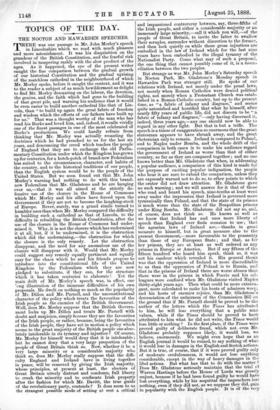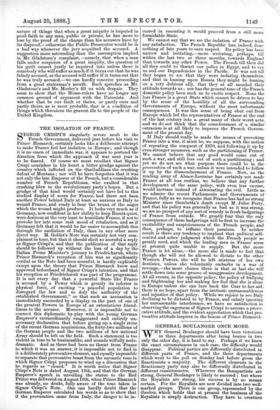TOPICS OF THE DAY.
THE NOCTON AND HAWARDEN SPEECHES.
PtRE was one passage in Mr. John Morley's speech Lincolnshire which we read with much pleasure and more astonishment. It was his disquisition on the grandeur of the British Constitution, and the fearful risk involved in tampering rashly with the slow product of the ages. As it happened, the eye of the present writer caught the fine comparison between the gradual growth of our historical Constitution and the gradual uprising of the matchless cathedral in the neighbourhood of which Mr. Morley spoke, before it caught the context, and it was to the reader a subject of as much bewilderment as delight to find Mr. Morley descanting on the labour, the devotion, the genius, and the faith which had gone to the building of that great pile, and warning his audience that it would be even easier to build another cathedral like that of Lin- coln, than "to build up again the great fabric of freedom and wisdom which the efforts of our fathers have built up for us." That was a thought worthy of the man who has read his Burke and loved him, and, indeed, it recalls vividly one of the finest passages in one of the most celebrated of Burke's productions. We could hardly refrain from thinking that Mr. Morley was actually recanting the doctrines which he had preached to us for the last six years, and denouncing the creed which teaches the people of England that they are to exchange the old Parlia- mentary Constitution under which the Kingdom has grown up for centuries, for a hotch-potch of brand-new Federalism less suited to the circumstances, character, and habits of the country, and to the historical traditions of our people, than the English system would be to the people of the United States. But we soon found out that Mr. John Morley's warning had nothing to do with this brand- new Federalism that Mr. Gladstone and he are hanging over us,—that it was all aimed at the strictly de- fensive use of the closure in the House of Commons which Mr. Morley and his allies have forced upon the Government if they are not to become the laughing-stock of Europe. Never, surely, was a grand simile turned to humbler uses than when Mr. Morley compared the difficulty in building such a cathedral as that of Lincoln, to the difficulty in rebuilding the British Constitution, after the use of the closure in the House of Commons had under- mined it. Why, it is not the closure which has undermined it at all, but, if it be undermined, it is the obstruction which did, the undermining,—the obstruction for which the closure is the only remedy. Let the obstruction disappear, and the need for any anomalous use of the closure will disappear with it. Would that Mr. Morley could suggest any remedy equally pertinent and equally easy for the chaos which he and his friends propose to introduce into the constitutional life of the United Kingdom by the Federalism which they are now pledged to substitute, if they can, for the structure which it has taken centuries to elaborate ! Yet the main drift of Mr. Morley's speech was, in effect, one 'ong illustration of the immense difficulties of his own proposals. He dwelt on nothing so much as the popularity of Mr. Dillon and Mr. Parnell, and the unconstitutional character of the policy which treats the favourites of the Irish people as the enemies of the British Government. Well, does Mr. Morley suppose that the British Govern- ment locks up Mr. Dillon and treats Mr. Parnell with doubt and suspicion, simply because they are the favourites of the Irish people, or rather, because, being the favourites of the Irish people, they have set in motion a policy which seems to the great majority of the British people one abso- lutely intolerable in its tyranny and injustice ? Of course, Mr. Morley for himself would deny that it is intolerable ; but he cannot deny that a very large proportion of the people of Great Britain think so. Now, whether it be a very large minority or a considerable majority who think so, does Mr. Morley really suppose that the diffi- culty England and Ireland have in living together in peace, will be removed by giving the Irish majority, whose principles, at present at least, the electors of Great Britain utterly distrust and condemn, full liberty to crush the minority and to confiscate Irish property after the fashion for which Mr. Davitt, the true guide of the revolutionary party, contends ? It does seem to us the strangest possible mode of setting at rest a critical and impassioned controversy between, say, three-fifths of the Irish people, and either a considerable majority or an immensely large minority,—call it which you will,—of the people of Great Britain, to invite the latter to swallow their scruples, surrender without discretion to the former, and then look quietly on while those gross injustices are embodied in the law of Ireland which for the last nine years have been embodied in the illegal tyranny of the Nationalist Party. Come what may of such a proposal, the one thing that cannot possibly come of it, is a recon- ciliation between the two peoples.
But strange as was Mr. John Morley's Saturday speech in Nocton Park, Mr. Gladstone's Monday speech in Hawarden Park was stranger still. He spoke of our relations with Ireland, not merely under the penal laws, not merely when Roman Catholics were denied political rights, not merely when a Protestant Church was estab- lished in a Roman Catholic country, but up to the present time, as "a fabric of infamy and disgrace," and seems quite astonished and horrified that what he himself, after nearly fifty years of public life, did not discern to be "a fabric of infamy and disgrace,"—only having discerned it, indeed, three years ago,—any one should now be able to regard in any other light. But that is but a trifle. The speech is a tissue of exaggeration so enormous that the great statesman appears to have shrunk away, and the great rhetorician only to remain Ireland is compared to Poland, and to Naples under Bomba, and the whole drift of the comparison in both cases is to make his audience regard the government of Ireland as worse than that of either country, so far as they are compared together ; and no one knows better than Mr. Gladstone that when, in addressing a popular audience, a comparison of this kind is made for the purpose of exciting popular indignation, the people who hear it are sure to extend the comparison, unless they are expressly warned not to do so, to other points to which the orator did not draw attention. Mr. Gladstone gave no such warning ; and we will answer for it that of those who read and heard his speech, nine-tenths at least went away under the impression that Ireland is governed more tyrannically than Poland, and that the state of its prisons is much worse than the state of the Neapolitan prisons under King Bomba. Mr. Gladstone did not say so, and, of course, does not think so. He knows as well as we know that Ireland has and uses more liberty of speech than England ever finds occasion to use ; that the agrarian laws of Ireland are,—thanks in great measure to himself, but in great measure also to the present Government, —more favourable to the peasantry than those of any European State ; and that, as for her prisons, they are at least as well ordered as any prisons in Europe or America. But if any fifteen of the fifteen hundred who heard him speak, think so, it was not his candour which revealed it. His general thesis was that the oppression of Ireland is more discreditable to us than the oppression of Poland is to Russia, and that in the prisons of Ireland there are worse abuses than there were in the prisons in which Poerio and his col- leagues were confined when Mr. Gladstone visited Naples thirty-eight years ago. Then what could be more extrava- gant, more calculated to make his hosts of admirers weep, and his hosts of enemies rejoice, than Mr. Gladstone's denunciation of the unfairness of the Commission Bill on the ground that if Mr.. Parnell should be proved to be the author of the letters which the Times has attributed to him, he will lose everything that a public Man values, while if the Times should be proved to have attributed to him what he did not write, the Times would lose little or nothing ? In the first place, if the Times were proved guilty of deliberate fraud, which not . even Mr.. Gladstone probably supposes likely, it would lose, we believe, enormously. We might even hope that as an English journal it would be ruined, to say nothing of what it would lose in damages in the English and Scotch actions. But it is true, of course, that if it were proved guilty only of moderate credulousness, it would not lose anything considerable, except in the way of heavy damages in the libel actions. But what has that to do with the matter ?
Does Mr. Gladstone seriously maintain that the trial of Warren Hastings before the House of Lords was grossly unjust, because if he had been found guilty he would have lost everything, while by his acquittal the impeachers lost nothing, even if they did not, as we suppose they did, gain in popularity with the English people. It is of the very nature of things that when a great iniquity is imputed in good faith to any man, public or private, he has more to lose by the proof of the charge than his accusers have by its disproof—otherwise the Public Prosecutor would be in a bad way whenever the jury acquitted the accused. A suggestion more astounding than the assumption implied in Mr. Gladstone's complaint, —namely, that when a man falls under suspicion of a great iniquity, the question of his guilt cannot justly be inquired into unless there is somebody who will suffer as much if it turns out that he was falsely accused, as the accused will suffer if it turns out that he was truly accused,—we can hardly conceive proceeding from a great statesman's mouth. Such speeches as Mr. Gladstone's and Mr. Morley's fill us with despair. They seem to show that the Home-rulers have no longer any common ground of argument with the Unionists. And whether that be our fault or theirs, or partly ours and partly theirs, as is most probable, that is a condition of things which threatens the gravest ills to the people of the United Kingdom.



































 Previous page
Previous page